Labanga Mohanta, a community leader, has worked for 22 years solving problems related to gender issues, encouraging girls’ education, and empowering women in the Thakurmunda block of Odisha’s Mayurbhanj district
 In rural Odisha, a phone call at 9 pm mostly means it is an emergency. So, when Labanga Mohanta, a social worker, received a call during that time, one evening, she was alarmed. On the other end of the line was Jhunu, a resident of a neighbouring village, who was sobbing as she told her that her drunk husband had mercilessly beaten her up and she had decided to end her life by drinking poison that night.
In rural Odisha, a phone call at 9 pm mostly means it is an emergency. So, when Labanga Mohanta, a social worker, received a call during that time, one evening, she was alarmed. On the other end of the line was Jhunu, a resident of a neighbouring village, who was sobbing as she told her that her drunk husband had mercilessly beaten her up and she had decided to end her life by drinking poison that night.
It took Labanga an hour of counselling Jhunu out of her suicidal thoughts. “I told her to think about her children before taking such a step,” recounts Labanga. The next day, at 7 am, Labanga rushed to the tribal village where Jhunu lived to ensure that she was alright.
This is a typical day in the life of Labanga, a community leader from Nishaposhi village in Thakurmunda block, whose number is on the speed dial of the mobile phones of several women in the nearby villages. The 49-year-old has been actively working towards resolving gender issues, encouraging girls’ education, creating awareness on women’s empowerment and health and making women financially independent in her area for the past 22 years.
A Women’s Day event that changed her life
In 1998, at the age of 23, when girls of her age were getting married or bearing children, Labanga, originally from Keonjhar district, had rebelled against marriage, asking her father why he can’t spend the money meant for her wedding on her education instead. She said the turning point in her life came the day she chose to attend a Women’s Day programme at a neighbouring village instead of joining her family on a pilgrimage to a famous temple.
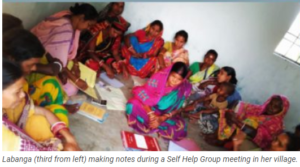 “Women from Self Help Groups (SHG) from different gram panchayats had come to the event and every group had a leader who spoke for them. But when it came to our Gram Panchayat, there was nobody to speak. So, I stepped up,” she recalls. Between that moment and now, Labanga has resolved numerous cases of domestic harassment, stopped child marriages and coaxed several women in and around her village into being self-reliant.
“Women from Self Help Groups (SHG) from different gram panchayats had come to the event and every group had a leader who spoke for them. But when it came to our Gram Panchayat, there was nobody to speak. So, I stepped up,” she recalls. Between that moment and now, Labanga has resolved numerous cases of domestic harassment, stopped child marriages and coaxed several women in and around her village into being self-reliant.
Introduced into the field by CYSD, which worked for promotion of SHGs and microfinance programme, Labanga, who was initially assigned the responsibility of three villages, now looks after 15 to 16 of them – not just in her capacity as a Sexual and Gender-based Violence (SGBV) warrior, but as a community leader who understands the plight of tribal women and has the intellectual wherewithal to solve them.
A harmless ‘threat’ goes a long way
Most of the crimes or injustices against women stem from the mentality of the husband or the in-laws that women are inferior, says Labanga. For instance, Jhunu’s husband beat her black and blue because he felt she had no right to argue with him when he comes home drunk. It takes a bit of counselling and also passive threatening to resolve such issues from the husband’s end. “Sometimes, abusive husbands don’t listen to local community leaders and question our authority in their affairs. It is then that we pretend to call our higher-ups at the government’s One-Stop Centre in Baripada, telling them that they must escalate the case and report it to the police. And, we ensure the husband is within earshot of the conversation. The plan always works and the husband comes around,” she says.
‘Victims often can’t identify, report crimes’
In many cases, victims don’t know that domestic violence or sexual abuse is a crime, says Labanga. Those who know either are afraid to seek help or don’t have access to a mechanism through which they can ask for help.
“Community leaders like Labanga are the first responders to the violence and try to resolve the issue with the help of the village ecosystem. They are also the ones who sensitise the victim on the nature of the crime and report the issue to the One-Stop Centre in case it goes out of their control,” says Uppali Mohanty, programme manager at CYSD, under which Labanga worked as an SGBV warrior.
Labanga says, women who are belittled as “infertile” by the village or those who are tortured by in-laws for not giving birth to a son, often don’t know that they are not at fault.
Covid intervention
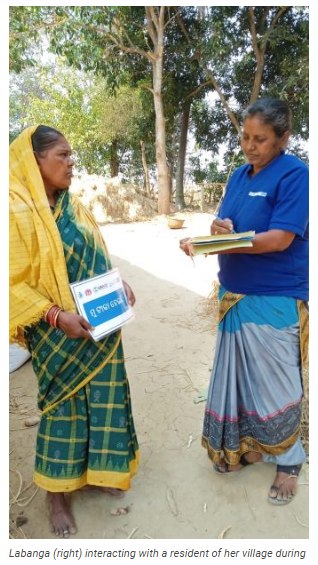 Labanga says the COVID-19 pandemic, which led to labourers returning home and schools shut down, also caused a rise in cases of domestic violence, child marriages and teenage elopement. “We stopped at least four cases of child marriages in my village during the pandemic. As schools shut down, parents of teenage girls aged below 18 wanted to marry them off. Some said they didn’t have the money to sponsor their daughter’s education anymore, some didn’t have faith their girls will pass the Class 10 exam and some said they were getting good alliances and didn’t want to miss out on a ‘suitable candidate’,” says Labanga, who is also part of the Child Protection Committee of her village. Labanga recounts one such success story when along with the SHG of her village, she stopped a child marriage in the Khandabandha village of her block.
Labanga says the COVID-19 pandemic, which led to labourers returning home and schools shut down, also caused a rise in cases of domestic violence, child marriages and teenage elopement. “We stopped at least four cases of child marriages in my village during the pandemic. As schools shut down, parents of teenage girls aged below 18 wanted to marry them off. Some said they didn’t have the money to sponsor their daughter’s education anymore, some didn’t have faith their girls will pass the Class 10 exam and some said they were getting good alliances and didn’t want to miss out on a ‘suitable candidate’,” says Labanga, who is also part of the Child Protection Committee of her village. Labanga recounts one such success story when along with the SHG of her village, she stopped a child marriage in the Khandabandha village of her block.
“The girl was barely 17 and when we tried to reason with the parents they resisted. We had to warn them that all of them will be put behind bars if they go ahead with the wedding,” says Labanga. The marriage was eventually stopped after the police, based on an anonymous tip-off, intervened.
According to data generated by CYSD, 21.3 per cent of women in the age group of 20-24 years in Odisha were married before 18 years of age. The percentage of women from this age group, who are married before the legal age of 18 in the Mayurbhanj district, is as high as 35 per cent.
Domestic violence
Labanga says, domestic violence is a major issue in these villages, and most of them happen due to drinking, loss of income or over past enmity. “Drinking is a serious problem seen in the Munda community in our area. We encounter cases of husbands beating up their wives and also that of drunk elderly couples throwing their daughters-in-law out of the house in her husband’s absence. In one such case, the couple threatened to kill the daughter-in-law when she tried to enter the house,” she says.
According to National Family Health Survey 2015-16, at least 37 per cent of women from Scheduled Castes and in the age group pf 15-49 years were subjected to some kind of physical or sexual violence committed by their husbands. The percentage of abused women in Scheduled Tribe communities was 40 per cent, while that in OBC was 33 per cent.
Challenges galore
In most cases, the resolution doesn’t happen in a day as Labanga and her team spend at least four-five days to get hold of the ‘accused’ itself. “Sounds funny now, but at times, the husband would be so sloshed from drinking that we would have to shake him out of his intoxication before counselling him. Some escape the house before we reach, while others take indefinite loo breaks,” she chuckles.
“Some men are aggressive. They would ask us to get lost, saying it is a husband-wife matter. But I stand my ground and calmly reply that ‘I am here on the complaint of the wife’. In such situations, treating hostility with aggression is not a good idea,” she says. The interventions come at a price too. Labanga has often been threatened or abused by families, in which she had prevented a child marriage from taking place or she had helped a woman take a stand against her husband or in-laws.
A resilient breed
If you ask Labanga, what motivates her to fight for women’s rights, she says it comes from within and has nothing to do with her background or gender. “I was always good in studies, and the girls in my class hate me for it. As a child, I had resolved that I will be different from them and not bow down to the pressures of patriarchy,” she affirms. A graduate, Labanga is the first person in her village to have passed the matriculation exam in her maiden attempt.
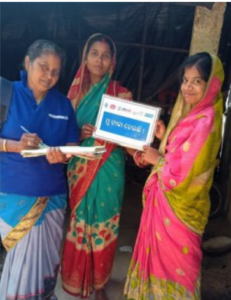 Labanga’s work also involves counselling women to form SHG groups that would make them financially independent. She has mobilised several women of her block to become ASHA and Anganwadi workers, community leaders and SHG members. Pratima Das, president of an SHG group of a nearby village, who was initiated into the field by Labanga describes her as a “resilient woman”, who is singularly committed to her job.
Labanga’s work also involves counselling women to form SHG groups that would make them financially independent. She has mobilised several women of her block to become ASHA and Anganwadi workers, community leaders and SHG members. Pratima Das, president of an SHG group of a nearby village, who was initiated into the field by Labanga describes her as a “resilient woman”, who is singularly committed to her job.
“In fact, it was Labanga Didi who stopped me from marrying off my minor daughter last year. She sat down with our family and described why an early marriage will be dangerous for the health of my girl. Thanks to her, now my daughter is pursuing her education,” Pratima points out. The mother of a 22-year-old, who is doing her B.Ed. in Andhra Pradesh, Labanga says that she has taught her daughter to be self-reliant and brave. For her, financial independence is very important for women. “You can only raise your voice against atrocities or argue with your husband and in-laws when you have the money to fend for yourself. Having your own income also makes you equal to men and earns prestige in society,” she says.
 In the remote areas of Koraput District, specifically in the Dandabadi Gram Panchayath, there is a village called Padapadar with around 60 households. The primary issue in this village is the deeply entrenched problem of child marriage. No one in this village remains unmarried beyond the age of 17, and typically, marriages occur as early as age 15. There are two major reasons why this social problem continues to persist: i) Parents lack awareness regarding the importance of education, adolescent health, and menstrual health; and ii) The absence of a proper education system results in high dropout rates.
In the remote areas of Koraput District, specifically in the Dandabadi Gram Panchayath, there is a village called Padapadar with around 60 households. The primary issue in this village is the deeply entrenched problem of child marriage. No one in this village remains unmarried beyond the age of 17, and typically, marriages occur as early as age 15. There are two major reasons why this social problem continues to persist: i) Parents lack awareness regarding the importance of education, adolescent health, and menstrual health; and ii) The absence of a proper education system results in high dropout rates.
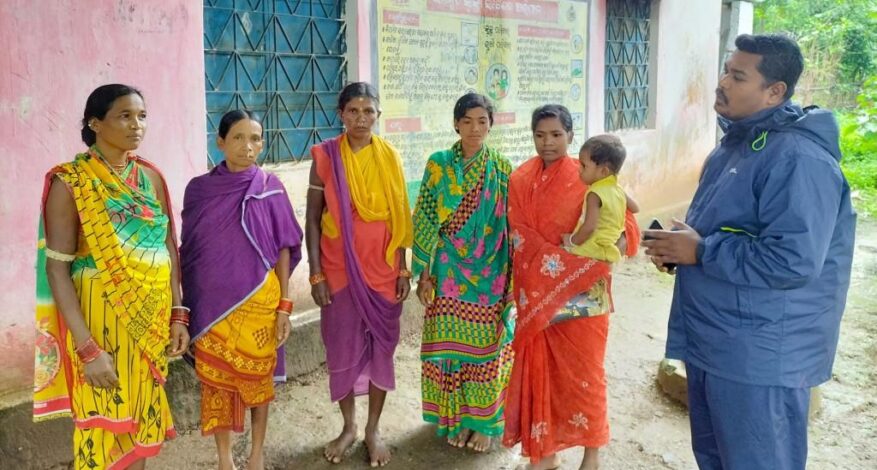
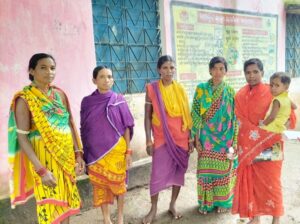 The community and citizen leader of Patiapadar is Dharmendra, a 25-year-old farmer. He has actively engaged in identifying the numerous challenges faced by the villagers and working towards potential solutions. Dharmendra expressed his concerns, stating, “The residents of this village encounter several difficulties, ranging from an unstable income to the inability to access government schemes and policies. These circumstances have kept the people of this village in isolation. Witnessing the struggles of the villagers, I have always aspired to make a positive difference for them. My opportunity to do so arose through CYSD when I became a community leader.”
The community and citizen leader of Patiapadar is Dharmendra, a 25-year-old farmer. He has actively engaged in identifying the numerous challenges faced by the villagers and working towards potential solutions. Dharmendra expressed his concerns, stating, “The residents of this village encounter several difficulties, ranging from an unstable income to the inability to access government schemes and policies. These circumstances have kept the people of this village in isolation. Witnessing the struggles of the villagers, I have always aspired to make a positive difference for them. My opportunity to do so arose through CYSD when I became a community leader.” However, Dharmendra’s primary focus is on addressing the central issue: preventing villagers from leaving in search of livelihood opportunities elsewhere. He expressed his goal, stating, “I aspire for our people to remain in the village, earn their livelihood here, and actively contribute to the village’s development. My aim is to assist them in creating sustainable livelihood opportunities that provide a stable income throughout the year.” Dharmendra’s determination to enhance the quality of life for his fellow villagers reflects his commitment to fostering lasting positive change within the community.
However, Dharmendra’s primary focus is on addressing the central issue: preventing villagers from leaving in search of livelihood opportunities elsewhere. He expressed his goal, stating, “I aspire for our people to remain in the village, earn their livelihood here, and actively contribute to the village’s development. My aim is to assist them in creating sustainable livelihood opportunities that provide a stable income throughout the year.” Dharmendra’s determination to enhance the quality of life for his fellow villagers reflects his commitment to fostering lasting positive change within the community. With very little time to spare, Dharmendra needed to act quickly. He approached the ASHA worker in his village to initiate the birth certificate application process, only to discover that the baby’s birth had not been officially registered. Dharmendra recounted, “The baby’s health was deteriorating rapidly, and time was running out. I immediately initiated the process to obtain the baby’s birth certificate. With the assistance of a legal advocate, we obtained an affidavit. This was submitted to the district collector’s office, and the process had begun. Within two weeks, the birth certificate was granted. It was then issued at the hospital, and the operation was successful. The baby is now healthy and hailing. I am incredibly grateful to have been part of a life-saving endeavor,” Dharmendra expressed.
With very little time to spare, Dharmendra needed to act quickly. He approached the ASHA worker in his village to initiate the birth certificate application process, only to discover that the baby’s birth had not been officially registered. Dharmendra recounted, “The baby’s health was deteriorating rapidly, and time was running out. I immediately initiated the process to obtain the baby’s birth certificate. With the assistance of a legal advocate, we obtained an affidavit. This was submitted to the district collector’s office, and the process had begun. Within two weeks, the birth certificate was granted. It was then issued at the hospital, and the operation was successful. The baby is now healthy and hailing. I am incredibly grateful to have been part of a life-saving endeavor,” Dharmendra expressed.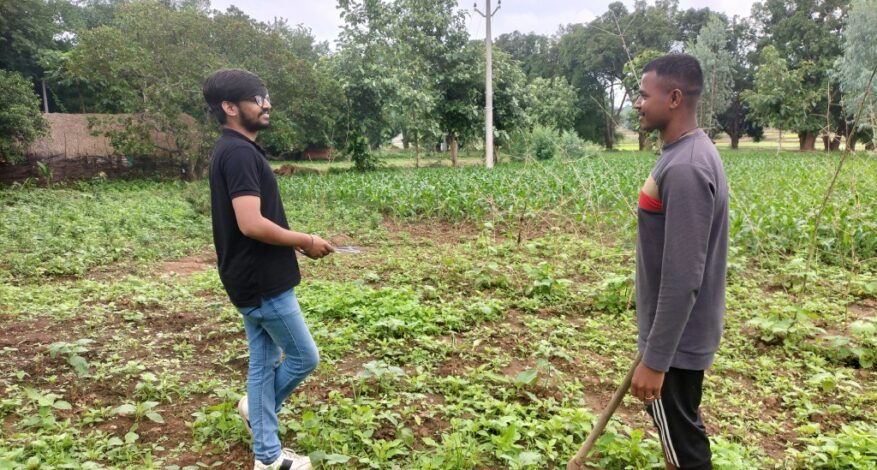
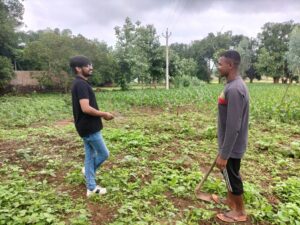 Iswar’s aspiration to improve his village caught the attention of CYSD’s community facilitators. When searching for an engaged community member, the residents of Gundalia Guda were determined that Iswar should become their community leader. Iswar admitted, “Initially, I had no idea what it meant to be a community leader or what responsibilities it entailed. However, I was thrilled to learn that this role could be my gateway to developing my village.”
Iswar’s aspiration to improve his village caught the attention of CYSD’s community facilitators. When searching for an engaged community member, the residents of Gundalia Guda were determined that Iswar should become their community leader. Iswar admitted, “Initially, I had no idea what it meant to be a community leader or what responsibilities it entailed. However, I was thrilled to learn that this role could be my gateway to developing my village.”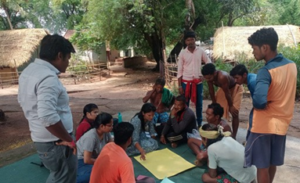 Iswar emphasized, “Once the road is constructed, I believe that many of the village’s problems can be resolved. Lack of proper connectivity has hindered access, especially during medical emergencies.” Iswar recounted that during the rainy season, he and other villagers had to carry patients and walk nearly 2 kilometers on muddy roads to access medical facilities. “I’m delighted that one of the village’s major issues has been addressed, and it fills me with pride to have played a vital role in bringing about this change,” he expressed.
Iswar emphasized, “Once the road is constructed, I believe that many of the village’s problems can be resolved. Lack of proper connectivity has hindered access, especially during medical emergencies.” Iswar recounted that during the rainy season, he and other villagers had to carry patients and walk nearly 2 kilometers on muddy roads to access medical facilities. “I’m delighted that one of the village’s major issues has been addressed, and it fills me with pride to have played a vital role in bringing about this change,” he expressed.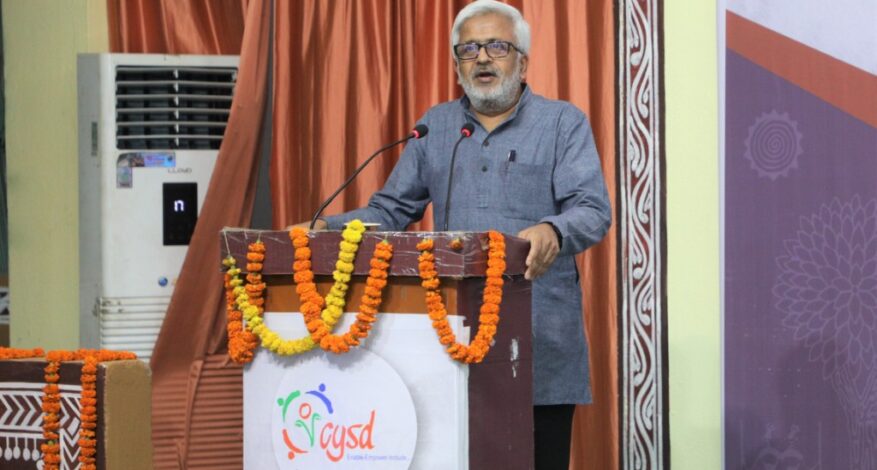
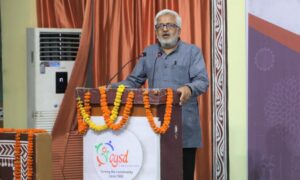 “Poverty is a state, where a person lacks the basic capacity to participate effectively in the society. Poverty in a democracy is a denial of services and opportunities to lead a long, healthy, creative life and enjoy a decent standard of living. We see poverty as an instrument which normally facilitates too much capital to grow. There is great potential of human and social capital for the poor to grow or reserve. People with too much capital are a causality. Therefore, we are focusing on sensitising the community on the development activities undertaken through various flagship schemes and programmes; and also enabling people to understand their roles and responsibilities and expand their capacity towards building a sustainable community.
“Poverty is a state, where a person lacks the basic capacity to participate effectively in the society. Poverty in a democracy is a denial of services and opportunities to lead a long, healthy, creative life and enjoy a decent standard of living. We see poverty as an instrument which normally facilitates too much capital to grow. There is great potential of human and social capital for the poor to grow or reserve. People with too much capital are a causality. Therefore, we are focusing on sensitising the community on the development activities undertaken through various flagship schemes and programmes; and also enabling people to understand their roles and responsibilities and expand their capacity towards building a sustainable community.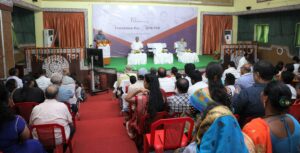 Nations around the world are challenged on how to ensure the benefits of governance and development reach the last mile. When all things are done, what really matters is whether the person at the last mile is feeling the impact of, and getting the benefits of good governance. Democracy calls for a shift from Jamindari to Jan Bhagidari or effective partnership. The partnership is very dynamic which requires relationship building that continues for a longer time. It demands both independence and interdependence in terms of behavioural competency, functional competency, and domain competency. It requires both changes in the mindset and mindset to change. We have to develop an attitude to learning from the community, the CSOs, the government, the media-building narratives, and the academia. Let’s work together and learn from each other. Influencing the state on how to work with other actors including the CSOs; and mobilising the CSOs to work with the government is very critical. Above all, the community is always at the centre. Starting from brainstorming with the community for project formulation/designing, to participatory project implementation, monitoring & evaluation, review-cum-reflection are important for the success of the project.
Nations around the world are challenged on how to ensure the benefits of governance and development reach the last mile. When all things are done, what really matters is whether the person at the last mile is feeling the impact of, and getting the benefits of good governance. Democracy calls for a shift from Jamindari to Jan Bhagidari or effective partnership. The partnership is very dynamic which requires relationship building that continues for a longer time. It demands both independence and interdependence in terms of behavioural competency, functional competency, and domain competency. It requires both changes in the mindset and mindset to change. We have to develop an attitude to learning from the community, the CSOs, the government, the media-building narratives, and the academia. Let’s work together and learn from each other. Influencing the state on how to work with other actors including the CSOs; and mobilising the CSOs to work with the government is very critical. Above all, the community is always at the centre. Starting from brainstorming with the community for project formulation/designing, to participatory project implementation, monitoring & evaluation, review-cum-reflection are important for the success of the project.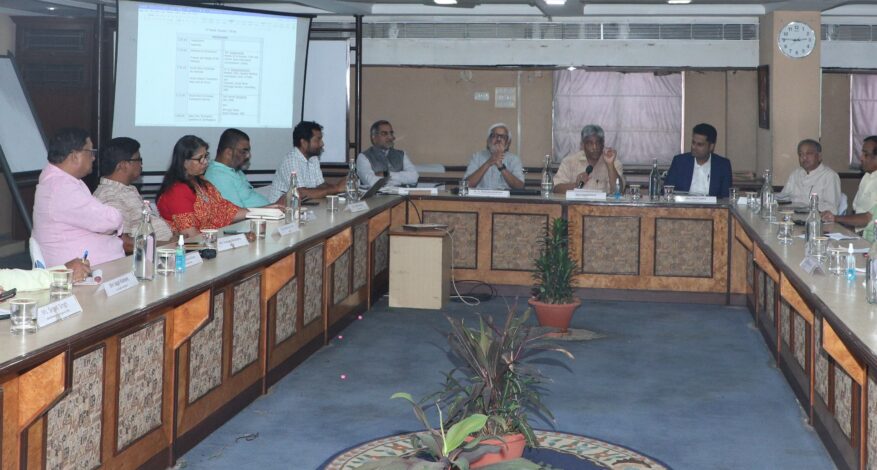
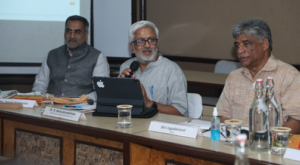 Keeping this in mind, a dialogue of Civil Society on the Social Stock Exchange Framework was organized by CYSD on 23rd March 2023 in Bhubaneswar on the eve of its 41st Foundation Day. Dr. R Balasubramaniam, Founder of GRAAM and Chair of the SSE Advisory Board, currently Member of the Capacity Building Commission, Govt. of India who joined this dialogue assisted the Odishan CSO representatives in clarifying various aspects of the SSE framework. Moreover, a few senior officials like, Mr. Jeevan Sonparote from Securities & Exchange Board of India (SEBI) and Mr. Avik Gupta from National Stock Exchange of India (NSE) also joined the workshop and guided the delegates on how their NPOs can be registered with SSE before initiating fund raising: eligibility criteria for Social Enterprises including Disclosures, Process overview and Value Proposition.
Keeping this in mind, a dialogue of Civil Society on the Social Stock Exchange Framework was organized by CYSD on 23rd March 2023 in Bhubaneswar on the eve of its 41st Foundation Day. Dr. R Balasubramaniam, Founder of GRAAM and Chair of the SSE Advisory Board, currently Member of the Capacity Building Commission, Govt. of India who joined this dialogue assisted the Odishan CSO representatives in clarifying various aspects of the SSE framework. Moreover, a few senior officials like, Mr. Jeevan Sonparote from Securities & Exchange Board of India (SEBI) and Mr. Avik Gupta from National Stock Exchange of India (NSE) also joined the workshop and guided the delegates on how their NPOs can be registered with SSE before initiating fund raising: eligibility criteria for Social Enterprises including Disclosures, Process overview and Value Proposition.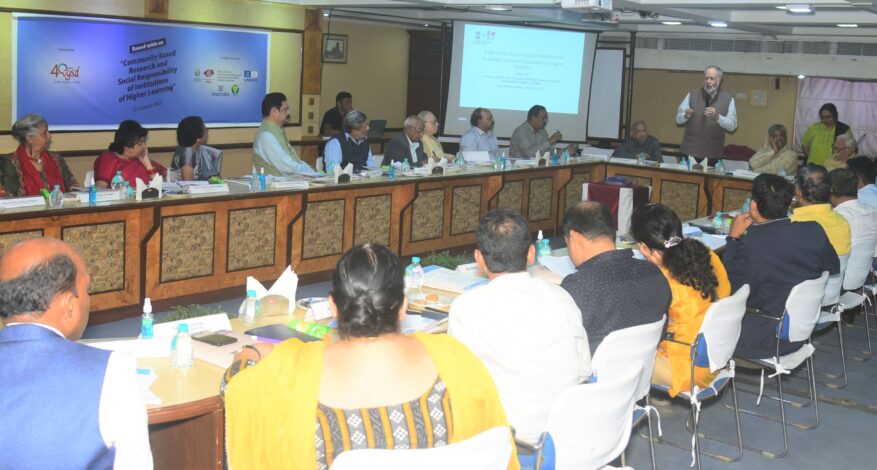
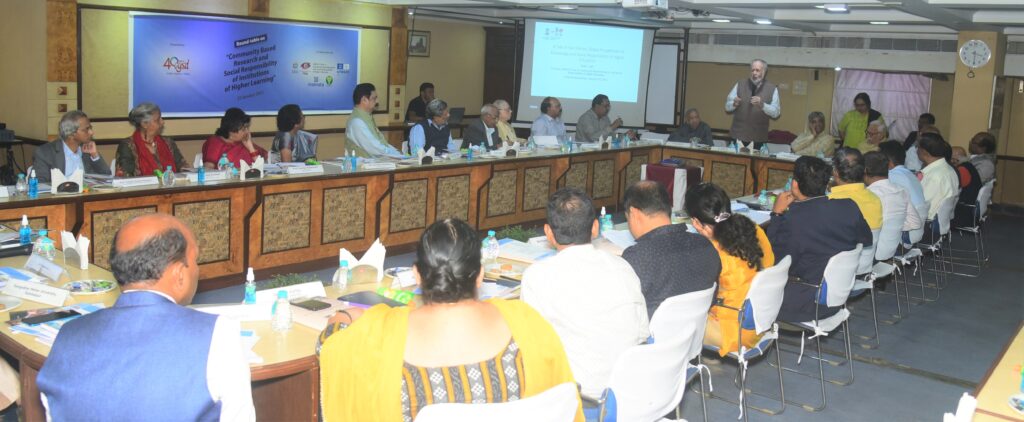 Joining the round-table, Dr. (Mrs.) Pankaj Mittal, Secretary General, Association of Indian Universities, in her key note address highlighted the disconnect between the universities and the society; and the consequences. Higher educational institutions need to bring in social responsibility and community in their vision and development mechanisms to adopt a functional approach to community engagement. University Society Responsibility (USR) is as important as the Corporate Social Responsibility (CSR), she said. Regular interface between the university and the community and exchange of knowledge are very critical to strengthen engagement with the society. The students pursuing higher education need to understand the issues and challenges of the community and develop projects to address them. Therefore, the community knowledge needs to be extracted through research, analyzed, documented and integrated with the university curriculum. The opportunities available under Unnat Bharat Abhiyan (UBA) can be harnessed for the purpose, added Dr. Pankaj.
Joining the round-table, Dr. (Mrs.) Pankaj Mittal, Secretary General, Association of Indian Universities, in her key note address highlighted the disconnect between the universities and the society; and the consequences. Higher educational institutions need to bring in social responsibility and community in their vision and development mechanisms to adopt a functional approach to community engagement. University Society Responsibility (USR) is as important as the Corporate Social Responsibility (CSR), she said. Regular interface between the university and the community and exchange of knowledge are very critical to strengthen engagement with the society. The students pursuing higher education need to understand the issues and challenges of the community and develop projects to address them. Therefore, the community knowledge needs to be extracted through research, analyzed, documented and integrated with the university curriculum. The opportunities available under Unnat Bharat Abhiyan (UBA) can be harnessed for the purpose, added Dr. Pankaj.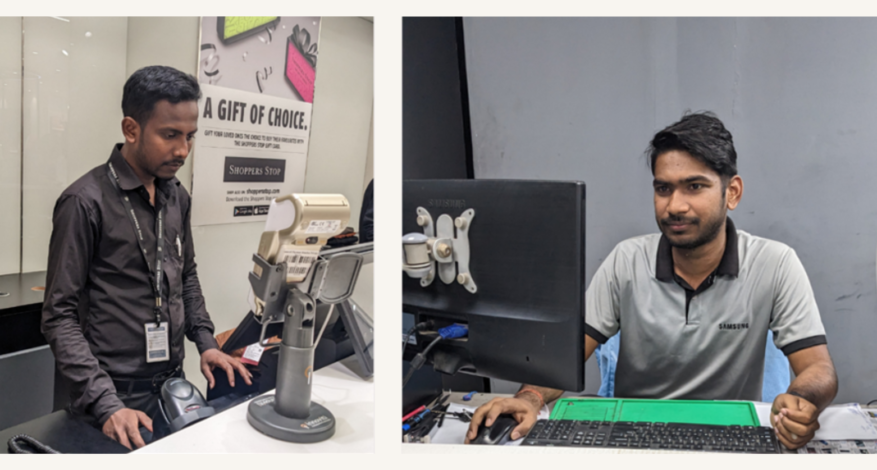
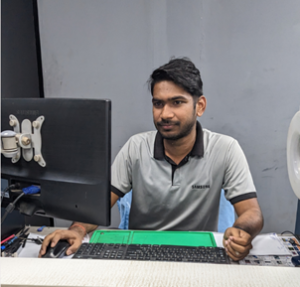 Ranjan Kumar Bhoi is a young man with big dreams, born into a family of daily labourers in Cuttack of Odisha State. Ranjan’s father struggled to make ends meet for his six-member family. Despite this, Ranjan never gave up on his dreams and continued his education until graduation. Unfortunately, financial constraints forced him to discontinue further studies. But, Ranjan’s ambition never wavered, and he soon heard about a short-term training course on ‘Retail Sales Associate’ being offered by CYSD in Bhubaneswar. He enrolled and completed the program, emerging as a confident and skilled sales executive, and got placement in Shoppers Stop with an annual salary of INR 129,600. Ranjan’s journey since receiving the training has been truly remarkable. He is now more confident, committed, and has even started saving for the future. Ranjan’s father is proud of him and grateful for the changes he has seen in his son after joining the program. Ranjan’s newfound skills and confidence have given him the motivation to grow further, and he is determined to make the most of this opportunity. ” The Retail Sales Associate Training course imparted by CYSD was truly a life-changing moment, and I will always remain grateful for creating such opportunity”, says cheerful Ranjan.
Ranjan Kumar Bhoi is a young man with big dreams, born into a family of daily labourers in Cuttack of Odisha State. Ranjan’s father struggled to make ends meet for his six-member family. Despite this, Ranjan never gave up on his dreams and continued his education until graduation. Unfortunately, financial constraints forced him to discontinue further studies. But, Ranjan’s ambition never wavered, and he soon heard about a short-term training course on ‘Retail Sales Associate’ being offered by CYSD in Bhubaneswar. He enrolled and completed the program, emerging as a confident and skilled sales executive, and got placement in Shoppers Stop with an annual salary of INR 129,600. Ranjan’s journey since receiving the training has been truly remarkable. He is now more confident, committed, and has even started saving for the future. Ranjan’s father is proud of him and grateful for the changes he has seen in his son after joining the program. Ranjan’s newfound skills and confidence have given him the motivation to grow further, and he is determined to make the most of this opportunity. ” The Retail Sales Associate Training course imparted by CYSD was truly a life-changing moment, and I will always remain grateful for creating such opportunity”, says cheerful Ranjan. Similarly, Rabindra Prusty was just like any other young man from his small town in Khurda, Odisha. Coming from a resource poor family, with his father as the sole earning member, Rabindra’s ambition and passion to succeed in life was unmatched. Despite the odds, he managed to complete his intermediate education, making him the highest qualified in his family. When he joined the Retail Sales Associate course offered by CYSD in February 2021, little did he know that it would change his life forever. The training not only helped him groom himself and enhance his digital knowledge but also gave him the confidence to think beyond his limitations. Rabindra’s hard work and dedication paid off when he was placed through the training center at SAMSUNG Care with an annual salary of INR 84,000. His father, who was initially hesitant about his son joining the course, now proudly boasts about the life-changing impact it had on both Rabindra and the family. “My journey from being just another young man from a small town to a successful professional is a testament to the fact that with hard work, dedication and the right opportunities, one can overcome any obstacle and achieve his/her dreams”, says delightful Rabindra.
Similarly, Rabindra Prusty was just like any other young man from his small town in Khurda, Odisha. Coming from a resource poor family, with his father as the sole earning member, Rabindra’s ambition and passion to succeed in life was unmatched. Despite the odds, he managed to complete his intermediate education, making him the highest qualified in his family. When he joined the Retail Sales Associate course offered by CYSD in February 2021, little did he know that it would change his life forever. The training not only helped him groom himself and enhance his digital knowledge but also gave him the confidence to think beyond his limitations. Rabindra’s hard work and dedication paid off when he was placed through the training center at SAMSUNG Care with an annual salary of INR 84,000. His father, who was initially hesitant about his son joining the course, now proudly boasts about the life-changing impact it had on both Rabindra and the family. “My journey from being just another young man from a small town to a successful professional is a testament to the fact that with hard work, dedication and the right opportunities, one can overcome any obstacle and achieve his/her dreams”, says delightful Rabindra.

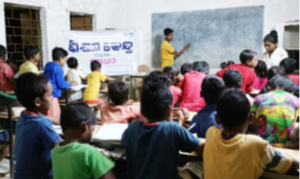 It was a calm Sunday morning in Mendukuli village, one of the southernmost remote areas – once a Maoist-dominated district, Malkangiri, in the state of Odisha. Cutting through the calmness of the morning, chants of 20-odd highly enthusiastic children were reverberating in the village community learning centre. They were learning backwards counting through a song while around 40 others were busy doing their class-appropriate studies. It was the picture of a learning centre set up by the villagers. Mendukuli under Dalapatiguda gram panchayat in Mathili block is one of the few tribal-dominated villages, where residents took it upon themselves to compensate for the learning loss of their children incurred during the school closure due to the Covid-induced lockdown.
It was a calm Sunday morning in Mendukuli village, one of the southernmost remote areas – once a Maoist-dominated district, Malkangiri, in the state of Odisha. Cutting through the calmness of the morning, chants of 20-odd highly enthusiastic children were reverberating in the village community learning centre. They were learning backwards counting through a song while around 40 others were busy doing their class-appropriate studies. It was the picture of a learning centre set up by the villagers. Mendukuli under Dalapatiguda gram panchayat in Mathili block is one of the few tribal-dominated villages, where residents took it upon themselves to compensate for the learning loss of their children incurred during the school closure due to the Covid-induced lockdown. When the world endured a huge learning loss in schools, the community-managed centres in several villages in Mathili, one of the most backward blocks in Odisha, are effectively making up for the loss, pointed out block education officer Sashibhushan Mishra. By inculcating learning habits among children, these centres help in a great way in enhancing the school attendance and checking the dropout rates, added Sashibhushan.
When the world endured a huge learning loss in schools, the community-managed centres in several villages in Mathili, one of the most backward blocks in Odisha, are effectively making up for the loss, pointed out block education officer Sashibhushan Mishra. By inculcating learning habits among children, these centres help in a great way in enhancing the school attendance and checking the dropout rates, added Sashibhushan.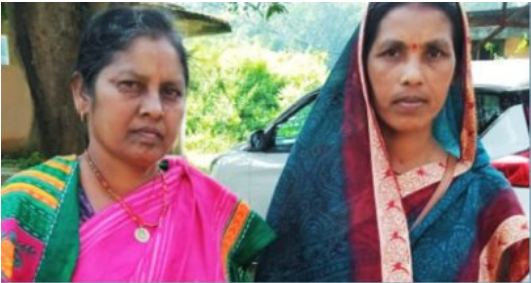
 In rural Odisha, a phone call at 9 pm mostly means it is an emergency. So, when Labanga Mohanta, a social worker, received a call during that time, one evening, she was alarmed. On the other end of the line was Jhunu, a resident of a neighbouring village, who was sobbing as she told her that her drunk husband had mercilessly beaten her up and she had decided to end her life by drinking poison that night.
In rural Odisha, a phone call at 9 pm mostly means it is an emergency. So, when Labanga Mohanta, a social worker, received a call during that time, one evening, she was alarmed. On the other end of the line was Jhunu, a resident of a neighbouring village, who was sobbing as she told her that her drunk husband had mercilessly beaten her up and she had decided to end her life by drinking poison that night. “Women from Self Help Groups (SHG) from different gram panchayats had come to the event and every group had a leader who spoke for them. But when it came to our Gram Panchayat, there was nobody to speak. So, I stepped up,” she recalls. Between that moment and now, Labanga has resolved numerous cases of domestic harassment, stopped child marriages and coaxed several women in and around her village into being self-reliant.
“Women from Self Help Groups (SHG) from different gram panchayats had come to the event and every group had a leader who spoke for them. But when it came to our Gram Panchayat, there was nobody to speak. So, I stepped up,” she recalls. Between that moment and now, Labanga has resolved numerous cases of domestic harassment, stopped child marriages and coaxed several women in and around her village into being self-reliant. Labanga says the COVID-19 pandemic, which led to labourers returning home and schools shut down, also caused a rise in cases of domestic violence, child marriages and teenage elopement. “We stopped at least four cases of child marriages in my village during the pandemic. As schools shut down, parents of teenage girls aged below 18 wanted to marry them off. Some said they didn’t have the money to sponsor their daughter’s education anymore, some didn’t have faith their girls will pass the Class 10 exam and some said they were getting good alliances and didn’t want to miss out on a ‘suitable candidate’,” says Labanga, who is also part of the Child Protection Committee of her village. Labanga recounts one such success story when along with the SHG of her village, she stopped a child marriage in the Khandabandha village of her block.
Labanga says the COVID-19 pandemic, which led to labourers returning home and schools shut down, also caused a rise in cases of domestic violence, child marriages and teenage elopement. “We stopped at least four cases of child marriages in my village during the pandemic. As schools shut down, parents of teenage girls aged below 18 wanted to marry them off. Some said they didn’t have the money to sponsor their daughter’s education anymore, some didn’t have faith their girls will pass the Class 10 exam and some said they were getting good alliances and didn’t want to miss out on a ‘suitable candidate’,” says Labanga, who is also part of the Child Protection Committee of her village. Labanga recounts one such success story when along with the SHG of her village, she stopped a child marriage in the Khandabandha village of her block. Labanga’s work also involves counselling women to form SHG groups that would make them financially independent. She has mobilised several women of her block to become ASHA and Anganwadi workers, community leaders and SHG members. Pratima Das, president of an SHG group of a nearby village, who was initiated into the field by Labanga describes her as a “resilient woman”, who is singularly committed to her job.
Labanga’s work also involves counselling women to form SHG groups that would make them financially independent. She has mobilised several women of her block to become ASHA and Anganwadi workers, community leaders and SHG members. Pratima Das, president of an SHG group of a nearby village, who was initiated into the field by Labanga describes her as a “resilient woman”, who is singularly committed to her job.